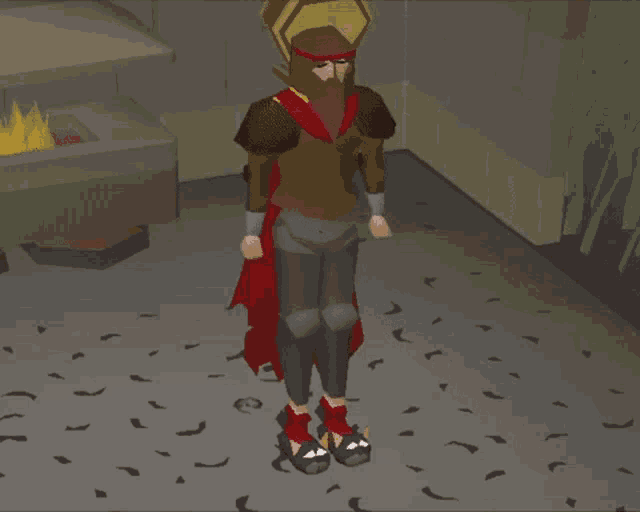[Theory] Old School Runescape & Tabletop Quest Design
Lessons from the 2007 medieval clicking simulator...
FOREWORD
I have played too much Old School Runescape. It seems likely, too, that I will continue to play too much Old School Runescape.
It's a skinnerbox, the epitome of "grindy", and the fact that certain accounts sell for hundreds of dollars on the black-market might give you some inkling as to how time consuming properly playing this game is... But it also hits a soft spot I didn't know I had. A soft spot a lot of depressed 20 and 30 somethings also seem to have, judging by player counts.
A part of that success is the quest writing.
Here, I'll document some techniques used in OSRS that would be good, and bad, practice for "old-school" GMs. As a staunch advocate of sandbox play, I personally weave quests into the gameworld like treasure hunts - a few hints that something interesting is going on somewhere, maybe someone offering a reward, and then let players achieve or ignore objectives however they see fit.
I'll also share the low-level OSRS quests I like the writing of the best, should this crazy, weird, ancient game pique your interest for design inspiration.
Oh, and very minor spoilers for some 20 year old click-game quests.
!!! NOTE !!! - This blogpost is available as a free, printable, PDF here. It was originally written for The Grand Exchange jam, hosted by Quasiwizard.
GOOD PRACTICES
Break a key MacGuffin into many parts.
The three survivors of Crandor split the map to the dragon lair between them, and each piece has since been lost.A trinity of combat, puzzle, and social encounters.
These aforementioned map pieces ended up in the clutches of a demon, hidden away in a wizard's tomb, and in the possession of a goblin felon.Chained objectives.
To get object A we need object B; to get object B we need object C. Similarly to "Breaking a MacGuffin into many parts". To disguise myself as a monkey I need a monkey talisman. To get the talisman I need to speak to a monkey. To speak to a monkey I need to find some monkey teeth to cast a spell... Etc. etc. 1Talking to things is fun, and often creates problems and solutions.
Cats, ghosts, monkeys, even camels each have things to say; all usually pretty disparaging about humans. The ability to talk to them makes a great reward (See "Varied rewards are better rewards" below).A memorable NPC has a unique look, good name, and key function.
Aggie the dye-maker is a retired witch who now dyes clothes if you bring her the ingredients.Quests are a learning tool.
To learn the layout of a city, most players would rather go run errands than take the historical guided tour. This also allows for introducing areas relevant to their needs; a market to pickpocket in, an arena to fight in.Varied rewards are better rewards.
Gold gets stale or loses value2. Instead; new transportation methods, new locations, new monster species, and new weapons or tools are all great. One of the most popular quests even rewards a farming allotment! The best rewards unlock new quest opportunities too; like the magic Ring of Visibility that lets players subsequently taken on hidden quests.A voyage is a quest in itself.
There is a reason roadtrip movies got so popular. Sailing to a mysterious island of isolated rune witches, crawling through a deadly subterranean mountain passage, crash-landing a glider onto an island of sapient monkeys; all these provide clear stakes, a clear goal, and many possible dilemmas to solve. Travel is fun.Lore is best when subtle; shown not told.
For many people, the realisation that several seemingly random unrelated teleportation spells actually correlate to the sites of ancient cities was a "mind-blown" moment. Same goes for the most powerful metal in the game really being created by a forgotten precursor race, hence why players can't smith or mine it themselves. These details impact the world but aren't explained, if they're explained at all, until after they've already been encountered - making lost knowledge feel truly learned and secret.There are many ways to start a quest.
A dusty book, a lost and found poster, needing access to a particular place, speaking to a malfunctioning golem. The "Quantum Ogre" gets a lot of flak, rightly so, but it isn't a Quantum Ogre if multiple potential adventures, each with multiple "starting points", exist simultaneously and independently.Twist villains and unusual alliances.
While infinitely harder to do in a linear quest such as in Runescape, the writing still pulls them off. Sigmund the goblin racist comes to mind. On the tabletop, we can do much more; utilising conflicting objectives and interests, parley before combat, and social manipulation for greater effect. Allow players to thwart deception and they'll feel intelligent; let them be betrayed and they'll develop vendettas for later use.
EXPERIMENTAL IDEAS
(Here be concepts that require some tinkering...)
Marked quest starts on a world map.
Likely too much railroad for me, but I guess that if players hung around in a tavern or something they might hear vague rumours that could be added to a world-map of optional things to check out or explore. My fear here would be that this would remove a lot of emergent quests and tasks from the game; some of my favourite moments have been players pursuing their own objectives or simply not knowing what was or wasn't plotted by me.Map teleportation.
Very dependent on the setting. I feel a lot of what makes an adventure an adventure comes from travel (see "A voyage is a quest" above) but for mad world-spanning missions this could be useful; especially if your players have short attention spans and big ambitions.Boss battles and multistage bosses.
I am certain someone smarter than me could run these well; though if the stakes are just "fight or die" things fall a little flat. It is more interesting, to me, to consider what happens if the monster wins. How would an eldritch horror enact its vengeance? Would the captive princess herself then slay the dragon? Exploring this would probably require starting a new campaign with new PCs; which I'm not opposed to - though I'm yet to be convinced that strictly mechanical battles are significantly more interesting than strategic planning or social schemes on the tabletop.Fetch quests are fun, actually.
This definitely depends on the theming and incorporation of other good design practices (especially concepts like "Chained Objectives" or "Breaking a key MacGuffin into many parts") but I maintain that an interesting errand, with clever writing, is better than a boring slog through endless lore and flat combat.
BAD PRACTICES3
Not respecting alternate solutions or choices.
Much of this comes from the nature of video games. If players find a way to sneak into the city instead of completing a quest which would reward access let them - but enforce the consequences of their choice. One quest in particular offered a rare choice in Runescape, where I could revive or destroy a lich... only for him to be resurrected in the a later quest anyway because the plot mandated it.Inflexibility in puzzles.
Another casualty of video game design. Goblin Punch's blog has a great mantra for dilemmas in tabletop games; that they either have many possible solutions or no obvious solution, and typically can't be handwaved by a class ability or specialised tool. Most Runescape puzzles are highly visual, concrete, and rigid, which doesn't translate well to the tabletop where players will often want to explore and test boundaries.Overly obvious puzzles.
See "Inflexibility in puzzles" above; I mention this here to highlight one quest where-in the dialogue bordered on "Sure is sad I, the fisherman, dropped my ring down this well. If only someone had a long object designed to catch things in bodies of water, and hook them out. That would be REEL nice... Here I am FISHING for a solution."Unclear objectives or NPC locations.
This is especially egregious for something like a murder mystery. If players don't know what questions they are meant to solve, how can they solve it? Keep questions obvious, let the players find the answers.Hiding things essential to continue.
If you need players to solve the puzzle or find the secret door to actually finish or progress the quest they are on, don't expect them to be able to do so. Offer alternative routes if possible, or keep the secret doors for legitimate secrets you don't expect they'll find.Grinds outside of player control.
There is one quest, in this game full of quests, that strikes anger into the heart of many a seasoned Runescape player. This is Rat Catchers; the quest so hated it became a meme. Bad writing aside, the main point of contention here is that the outcome of many actions (in this case catching rats) isn't under player control - they have to dispatch their cats to do it for them, based on RNG. Wherever possible, give players the reins. Within a situation from which players require a very specific outcome, being unable to interfere is awful design. Again, flexible interactivity is the golden phrase in this hobby.Traditional mazes.
As part of a dungeon crawl, sufficiently Jaquaysed, mazes could work; but mazes with one very specific intended path, and no hints to the correct route, often lead to needless backtracking. Instead, try the excellent Flux Space solution or minimise the punishment for taking false turns.Total invulnerability to NPC attacks.
This point here is largely moot in TTRPGs, but the Prayer skill in Runescape grants a trio of prayers called "Protect From Melee/Magic/Ranged". These make a lot of early quest battles, especially against big monsters that purely just swipe at you in melee, devoid of excitement. The design solutions in game for this is interesting; frequently newer foes will change the type of attack they'll make (a wizard will pull out a dagger when he sees his magic has no effect), or hit so hard that some damage goes through, or slowly drain your prayer points (a type of mana drained to use such abilities).
AFTERWORD
Finally, much of Old School Runescape's charm comes from the community and their impact on such a long-lived game. The amazing stories of the monkey nut economy boom, the players who collect burnt food, the Venezuelan gold farmer unions, the folk hero personas of the players who give themselves increasingly complex restrictions while playing... Even developer mishaps, such as the Falador Massacre, the twisted bush incident, or the time players were hacked from someone INSIDE the dev team all make for a collective play history and world-space. Each of these tales are legendary - and I don't think the best writing could capture experiencing these moments and stories entirely, soppy as that sounds.
The lesson here, and perhaps the lesson of TTRPG design overall, is that player stories and interactions can often out-do even the best design and carefully plotted plans... and perhaps the easiest way to enjoy ourselves is to embrace the social nature of tabletop play and embrace the flexible chaos.
POST-SCRIPT
Here are a list of quests I think the aspiring designer should play... though I realise this game is extremely time consuming. YouTuber Alien Food has an excellent series completing quests without the wiki or a guide. The frustration and confusion he encounters while questing inspired a lot of my observations here; and I highly recommend watching his experience and thought processes!
A special mention also goes to Quasiwizard’s “Further Adventures in the Ape Atoll”, written for the same jam as this document, which covers similar good GM principles.
Another special mention goes to Benign Brown Beast’s fantastic series of posts analysing Runescape and the potential translating of it into a tabletop setting. A lot of excellent points are raised there, especially from someone more mechanically minded than I am. I’m somewhat embarrased to have not included these originally; so do please read check them out!
Getting Ahead
Eyes of Glouphrie
The Ribbiting Tale of a Lily Pad Labour Dispute
Twilight's Promise - A great example of "Quests are a learning tool".
Cold War
The Golem
Dragon Slayer I - A classic example of many techniques mentioned here.
The Lost Tribe
One Small Favour - A pain to do, but genuinely hilarious.
Zogre Flesh Eaters - Interesting, quite simple, environmental puzzles.
Rum Deal
My Arm's Big Adventure
Desert Treasure
The Fremennik Isles
Clock Tower - Admittedly boring quest, but the dungeon here is great and wouldn't be out of place in an OSR game.
I do not like Shilo Village and think, even while hardly talked about, it is overrated as a quest.
Thank you for reading - sincerely. This blog is currently in a state of suspended animation as I decide what to do, or if I should leave Substack entirely…
If you found any of this useful, subscribing would show me writing these is something people want more of and that I’m not just here wasting everyone’s time.
Created using intellectual property belonging to Jagex Limited under the terms of Jagex's Fan Content Policy. This content is not endorsed by or affiliated with Jagex. Don’t sue me or I WILL go 1v1 in Wildy with you n00bs.
Note that this probably wouldn't work as a railroad, and in most TTRPG play this sort of thing occurs naturally as players develop a set plan. For example, here I wouldn't mandate that players MUST speak to a monkey for the talisman, but instead might allow a variant plan, such as a different disguise method or brutally mugging the monkey, to be substituted... though that might incur further consequences.
Unless, of course, the system uses experience for gold or such. Runescape's valueless coins mostly comes from MMORPG inflation, an interesting subject in its own right. On the tabletop though, receiving trade goods, arcane lore, or cryptic magic items will always be more interesting than receiving straight gold - at least in my humble experience as a tomb robber.
I'm no authority here at all: no one is. Obviously your game is your game, run it however you like - even if that means playing a railroad which would make most other GMs scream and implode into a small, but bloody, cluster of polyhedral dice. These are all suggestions, not hard rules. Learn from doing whenever possible.












